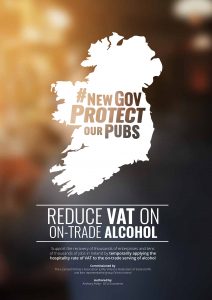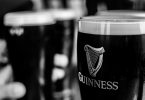Taxes take 28% of on-trade alcohol spend

Tony Foley’s report entitled Reduce VAT on on-trade alcohol is part of the #NewgovProtectOurPubs campaign.
In addition to hospitality’s direct employment here, thousands more are employed providing inputs to the on-trade such as catering, cleaning, music and security.
Tony Foley’s report entitled Reduce VAT on on-trade alcohol is part of the #NewgovProtectOurPubs campaign.
The report points out that personal expenditure on on-licence alcohol totalled €5.677 billion last year. Of this, €1.604 billion – or 28% – was taken in expenditure tax: €0.555 billion in excise & €1.049bn in VAT.
The high tax take on alcohol means that Ireland has the highest wine excise of all 28 EU states and the UK. It has the second-highest excise rate on beer and the third-highest on spirits making Ireland the second-highest of the EU27 and the UK in terms of aggregate alcohol excise taxes, behind only Finland.
The report points out too that pubs and other on-licensed enterprises are very employment-intensive compared to off-licences. They also generate much more VAT than off-licences.
Covid-19 restrictions vs demand
The report points to the disparity between demand and Covid-19 policy restraints on a pub’s capacity to meet that demand.
“If aggregate supply (or a specific sectoral supply) cannot respond to the increase in aggregate demand because of public health-related capacity constraints” argues the report, “there’s no point in stimulating the economy (or the sector) through boosting aggregate demand.”
Indeed, it could be argued that there’s little point in introducing measures to stimulate the sector through higher demand at present.
The report indicates that when the HSE’s two-metre Social Distancing guidelines are applied in any 100 sq m area in an on-licensed premises, standing capacity will diminish to 12.5% while seating capacity reduces to 34% of pre-crisis levels. However under the WHO provisions of one metre Social Distancing, standing capacity would drop from 200 people to 100 (50%), while seated capacity in pubs and bar/restaurants would decrease from 100 to 65 (65%).
By both their widespread physical infrastructure and their hospitality the country’s licensed trade supports the international and domestic tourism product. Measured as share of employment in the non-financial business sector in 2016, Ireland’s tourism sector share of 13.3% was fourth-highest in the EU.
The hospitality industry and its drinks-related activities
Thousands of enterprises in Ireland are involved in drinks-related activities at retail level.
As of 2018 there were 8,142 Publican’s and other bar licences, 2,329 Wine on-licences (restaurants) and 476 Special Restaurant Licences.
Tony Foley’s report points out that small enterprises dominate the drinks and hospitality sector.
Of the 19,205 enterprises in the hospitality sector (pubs, hotels, restaurants) just under four in five (or 15,328 of them) employ less than 10 people.
Only 44 enterprises employ 250 persons or more, so those hospitality enterprises employing less than 50 people account for 96.5% of all hospitality enterprises.
Putting this in terms of turnover, 8.6% of pubs have average annual sales of €952,500 or higher while just under half (49.5%) of pubs (that’s 3,923 enterprises) have annual sales of under €190,500.
Cost of reduced VAT rate
In arguing for a reduced VAT rate from August to December, the report states that based on CSO data the 2019 on-licence alcohol sales were about €5.722 billion including VAT.








